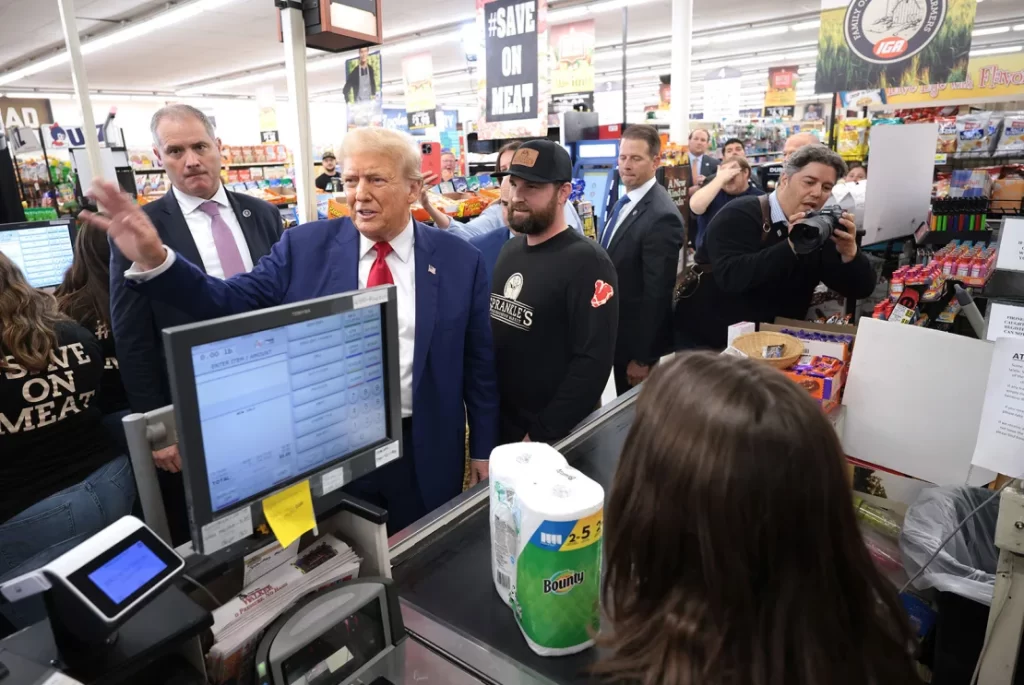Trump’s Fear-Based Economic Rhetoric Resurfaces
3 min read
Trump visits Sprankle's Neighborhood Market on September 23, 2024 in Kittanning, Pennsylvania.

Trump visits Sprankle's Neighborhood Market on September 23, 2024 in Kittanning, Pennsylvania.
In a recent speech to farmers in Pennsylvania, Donald Trump issued a dire warning: if he loses the upcoming election, “You won’t have a farm very long.” This statement reflects his broader strategy of using fear to rally support, particularly among rural Americans, whom he claims to protect from perceived threats, especially from China.
Trump’s rhetoric paints a grim picture of America, one filled with economic despair, rising crime, and immigration challenges. While many politicians typically foster hope and optimism to attract voters, Trump’s approach is markedly different. For instance, during a debate with Vice President Kamala Harris, he ominously predicted that a Harris presidency could lead the nation into World War III and a severe economic depression.
His strategy is not merely about creating a negative narrative; it also includes scapegoating groups he perceives as threats. Recently, Trump suggested that “the Jewish people” could bear some blame if he loses, reinforcing harmful stereotypes of dual loyalty. Additionally, he disparaged Catholic voters who support Harris, claiming they are “literally being persecuted” by her administration.
Trump’s use of all-caps messages on social media further exemplifies his authoritarian style. For instance, he proclaimed that “WOMEN WILL BE HAPPY, HEALTHY, CONFIDENT AND FREE” under his presidency, presenting himself as the sole protector of their rights. At a recent rally, he assured women that he aims to be their defender, despite his history of legal troubles related to sexual misconduct.
During his speech to farmers, Trump highlighted energy costs, predicting that a Harris administration would lead to skyrocketing prices, threatening the livelihoods of those in agriculture. He claimed that if she were elected, rural areas would face severe economic hardships. This type of rhetoric is consistent with his long-standing narrative that America is “failing” and under threat.
Such alarmist predictions are not new for Trump. In 2020, he warned that if he were not re-elected, there would be no holidays or celebrations. While he made these statements amid the pandemic, the reality shifted as the nation began to recover under President Biden’s leadership.
Many of Trump’s dire predictions stem from his background as a businessman, where he often employed what he calls “truthful hyperbole.” However, as he transitioned into politics, this exaggerated rhetoric morphed into “alternative facts,” designed to suit his political ambitions. His warnings echo those of authoritarian leaders who personalize crises, suggesting that only they can save the country from ruin. His infamous declaration, “I alone can fix it,” from the 2016 Republican National Convention, encapsulates this approach.
Trump’s fear-driven tactics resonate with many of his supporters. They channel widespread frustrations regarding globalization and the challenges small farmers face today. He criticized China for purchasing U.S. farmland and failing to uphold agricultural trade agreements, asserting that Biden has not adequately addressed these issues. In an aggressive stance, he vowed to impose significant tariffs on Chinese imports if Congress opposed him, framing his actions as necessary for American interests.
Despite the questionable effectiveness of his previous policies, Trump maintains a strong narrative as a defender of farmers. He often highlights the billions in subsidies provided during his presidency, which were largely a response to the economic fallout from his trade war with China. In a recent claim, he asserted, “Nobody has done for farmers what I have done,” even though many farmers still faced challenges.
Polling data indicates that Trump continues to enjoy significant support, with many believing he is better suited to handle economic issues compared to Harris. In swing states like Arizona, North Carolina, and Georgia, recent polls show him leading in economic confidence among voters.
Harris is actively trying to bridge this gap by addressing economic disparities and voicing concerns about price gouging in supermarkets. However, she has not yet engaged in the kind of grassroots events that have helped Trump solidify his connection with voters. Her upcoming speech aims to detail plans for economic recovery and assistance for working Americans, but she must contend with Trump’s established narrative.
In the competitive landscape of American politics, Trump’s fear-based rhetoric, coupled with his populist strategies, continues to resonate with a significant portion of the electorate, making the upcoming election even more pivotal.